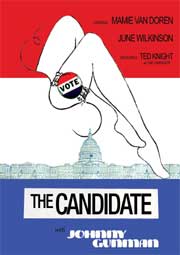 THE
CANDIDATE (1964)/JOHNNY GUNMAN (1957)
THE
CANDIDATE (1964)/JOHNNY GUNMAN (1957)Director(s): Robert Angus/Art Ford
Vinegar Syndrome
 THE
CANDIDATE (1964)/JOHNNY GUNMAN (1957)
THE
CANDIDATE (1964)/JOHNNY GUNMAN (1957)Vinegar Syndrome unearths a strange duo of monochrome programmers: the would-be political potboiler THE CANDIDATE, and the low-rent gangster noir with a message JOHNNY GUNMAN.
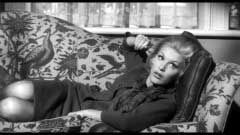
THE CANDIDATE is Massachusetts senate hopeful Frank Carlson (Ted Knight, THE MARY TYLER MOORE show), but it's his absconded congressional campaign manager Buddy Parker ("introducing" Eric Mason, KISS OF THE TARANTULA), who is under investigation following a laundry list of scandals by a congressional inquisition. Represented by brassy attorney Rogers (Robin Raymond, THERE'S NO BUSINESS LIKE SHOW BUSINESS) are Parker's social secretary/"procurer" Samantha Ashley (Mamie Van Doren, COLLEGE CONFIDENTIAL) and Carlson's fiancée Angela Wallace (June Wilkinson, THE PRIVATE LIVES OF ADAM AND EVE), an English immigrant with a shady past. Through a series of flashbacks, we learn of the way in which Parker climbed to the top with a "social club" catering to influential big wigs. He first meets Samantha while she is working at a hotel in Florida. Frank takes a liking to her, but the feeling is not mutual. Fortunately, Angela flees into her room while trying to escape the house detective and the wife of her lover and seems a more ideal companion to Frank (who is already concerned about how Parker's past activities will reflect on his campaign). It turns out, however, that Parker's own indiscretions with playgirl Mona (Rachel Romen, RUN ANGEL RUN) might be what tanks Frank's career and his own political ambitions.
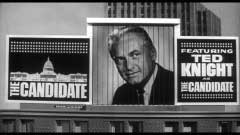 Allegedly
based on a book of the same name by Frank Moceri (although I haven't found any
records of it in library databases), THE CANDIDATE may have been shocking at
the time, but there's very little in its catalogue of vices that will surprise
today's viewer in light of the regular (and frequently more amusing) political
scandals. It's a treat to see Knight in a more dramatic role, but he actually
has very little to do here; and Mason is hardly a tragic figure or even a very
sympathetic one. The film is more of a showcase for its female cast members,
from Van Doren and Wilkinson – who spend much of their time miserable
despite the camera's exploitation of their bodacious figures – to tragic
Romen and Raymond's brassy attorney. For all of the production's glossiness
on a low budget – including photography by Stanley Cortez (SHOCK CORRIDOR)
who also shot VICE RAID and THE NAVY VS THE NIGHT MONSTERS with Van Doren –
the end credits sloppily cite Van Doren as "Christine Ashley" in the
end credits crawl.
Allegedly
based on a book of the same name by Frank Moceri (although I haven't found any
records of it in library databases), THE CANDIDATE may have been shocking at
the time, but there's very little in its catalogue of vices that will surprise
today's viewer in light of the regular (and frequently more amusing) political
scandals. It's a treat to see Knight in a more dramatic role, but he actually
has very little to do here; and Mason is hardly a tragic figure or even a very
sympathetic one. The film is more of a showcase for its female cast members,
from Van Doren and Wilkinson – who spend much of their time miserable
despite the camera's exploitation of their bodacious figures – to tragic
Romen and Raymond's brassy attorney. For all of the production's glossiness
on a low budget – including photography by Stanley Cortez (SHOCK CORRIDOR)
who also shot VICE RAID and THE NAVY VS THE NIGHT MONSTERS with Van Doren –
the end credits sloppily cite Van Doren as "Christine Ashley" in the
end credits crawl.
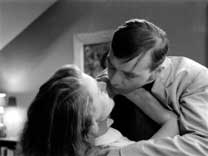
When gangster Lou Caddy (Nick Rosse) is finally caught and convicted (of tax evasion), he arranges for his territory and operations to be split in half between vicious Allie (Johnny Seven, TV's IRONSIDE) and cool Johnny G. (Martin Brooks, THE SIX BILLION DOLLAR MAN and THE BIONIC WOMAN). Allie – goaded by his wife Mimi (Playboy Playmate Carrie Radison) – does not want to share, however, and decides to rub Johnny out. News travels fast and Johnny takes to the street in search of Allie. Stopping off in a Greenwich Village café owned by Leona (Leona Anderson, THE HOUSE ON HAUNTED HILL), Johnny finds himself in the company of elderly plasterer Max (Anatol Winogradoff, SO LOVELY… SO DEADLY) and pretentious playwright Sidney (Woodrow Parfrey, DIRTY HARRY). All three take an interest in journalist "Coffee" (the enervating Ann Donaldson) who agrees to spend two hours with each man – before heading back to her home town having not found success in the city – in search of something to write about.
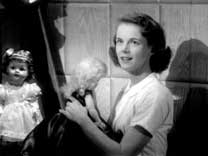 While
it might have made an effective poverty row noir a decade earlier or even an
arty, minimalist masterpiece in the hands of someone like Edgar G. Ulmer, JOHNNY
GUNMAN is just clunky and cheap. The structure of "Coffee" spending
time with each of the men serves only to give opportunities for her to moan
over her conflicted emotions about "caged tiger" Johnny and her fears
about what might become of him. There are some surprises to be had when the
creepy intellectual guy does turn out to be a creep, and there's some suspense
towards the end towards the climax but the direction of Art Ford – a music
show host who also penned a song for the film – is static and Donaldson's
protagonist is dull (Brooks, Seven, and Radison all give better performances
and were more deserving of a better script). The film does raise the issue of
juvenile delinquents following in the footsteps of gangsters, but only gives
it lip service.
While
it might have made an effective poverty row noir a decade earlier or even an
arty, minimalist masterpiece in the hands of someone like Edgar G. Ulmer, JOHNNY
GUNMAN is just clunky and cheap. The structure of "Coffee" spending
time with each of the men serves only to give opportunities for her to moan
over her conflicted emotions about "caged tiger" Johnny and her fears
about what might become of him. There are some surprises to be had when the
creepy intellectual guy does turn out to be a creep, and there's some suspense
towards the end towards the climax but the direction of Art Ford – a music
show host who also penned a song for the film – is static and Donaldson's
protagonist is dull (Brooks, Seven, and Radison all give better performances
and were more deserving of a better script). The film does raise the issue of
juvenile delinquents following in the footsteps of gangsters, but only gives
it lip service.
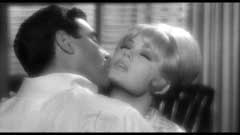 THE
CANDIDATE is presented in a progressive, anamorphic 1.85:1 widescreen transfer,
and the results are gorgeous throughout, giving the film the look of a studio
production rather than an independent (it was pretty much all shot at Samuel
Goldwyn Studios with all of the D.C. and Florida exteriors being stock footage).
Whatever hiss and crackling there is on the Dolby Digital 2.0 mono track is
thoroughly unobtrusive. JOHNNY GUNMAN's fullscreen transfer also looks beautiful
despite limitations of the production itself (both film's 35mm elements have
been mastered in 2K). This seems to be a reissue print since it contains both
the "Tudar Pictures" presents title card which is preceded by "The
Film Group presents". The Dolby Digital 2.0 mono is in slightly hissier
condition but that does not interfere with the dialogue. For fans of Van Doren
and Knight only. (Eric
Cotenas)
THE
CANDIDATE is presented in a progressive, anamorphic 1.85:1 widescreen transfer,
and the results are gorgeous throughout, giving the film the look of a studio
production rather than an independent (it was pretty much all shot at Samuel
Goldwyn Studios with all of the D.C. and Florida exteriors being stock footage).
Whatever hiss and crackling there is on the Dolby Digital 2.0 mono track is
thoroughly unobtrusive. JOHNNY GUNMAN's fullscreen transfer also looks beautiful
despite limitations of the production itself (both film's 35mm elements have
been mastered in 2K). This seems to be a reissue print since it contains both
the "Tudar Pictures" presents title card which is preceded by "The
Film Group presents". The Dolby Digital 2.0 mono is in slightly hissier
condition but that does not interfere with the dialogue. For fans of Van Doren
and Knight only. (Eric
Cotenas)